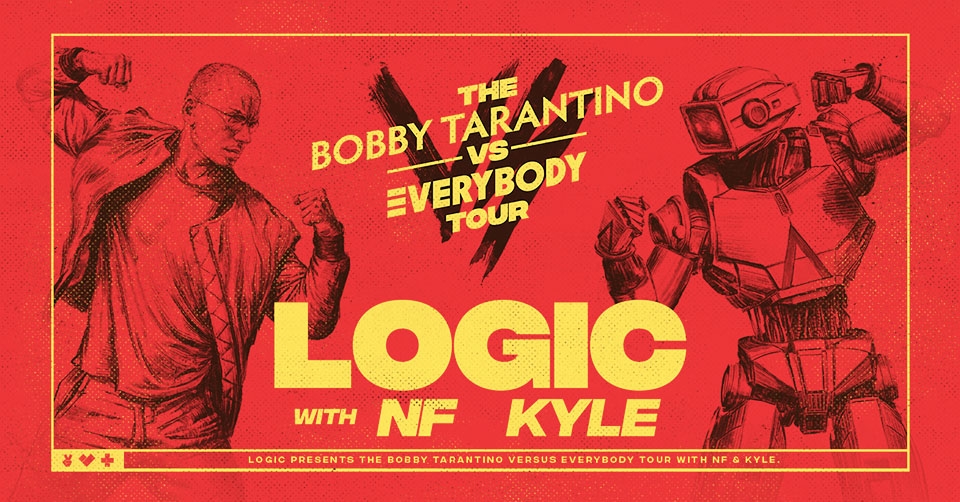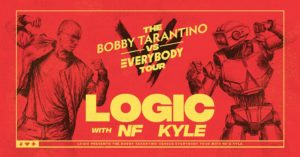

With the release of his new mixtape Bobby Tarantino II, Logic announced his Bobby Tarantino Versus Everybody Tour. The 33-date tour starts in Boston, MA.
By Sean Armstrong | Staff Writer
03/15/2018
Logic’s new mixtape Bobby Tarantino II, debuted March 9, and it’s likely not for fans of Logic’s previous work on Everybody.
The music opens up with an introduction starring pop-culture icons and cartoon characters Rick and Morty. In this opening, the two debate whether to listen to “mixtape” or “album” Logic — both showing different sides of the rapper and having divergent purposes. Eventually, they settle on Logic’s mixtape side, and this is where Bobby Tarantino II begins.
This intro establishes that the new work will be unlike the album that made the rapper a sensation last year. Mixtape Logic, as he has branded himself, is not about delivering a message or playing to any other typical tropes of the rap genre.
To be sure, Logic talks about topics that anyone could hear by flipping on the radio, but he does it for an audience that isn’t usually addressed. He does it for people that, like him, don’t always fit into the prescribed idea of “normal.”
This can be seen on the second track, “Overnight,” where the first verse says, “All these bad b*****s say they love me, I already know / Check the, check the bling that’s on my finger ’cause I’m married.” He brings up a subject emblematic of the pop-rap genre, then gives his own take on it. He talks about the rap norm then rejects that same norm for himself.
Later, Logic talks about partying on “Midnight,” but not in the way people would expect: “Everybody know I be / In the club VIP (sike, not me).”
The rapper doesn’t condemn any of the lifestyle choices he addresses but states they are not for him. The idea of taking a rap trope then rejecting it in the following line(s) is a trend for this mixtape; the previous examples are just two of the more obvious instances.
For the fans that fell in love with the rapper’s music over the last 10 months, this mixtape is probably not for you. That being said, this record still has quality throughout if the listener puts in the work to understand what the purpose is: Logic simply trying to be who he is and be unapologetic in doing so.
This begs the question, if Bobby Tarantino II is not for fans of Everybody, then who is it for? The record is not for people who want a larger meaning that culminates throughout the course of the album. This mixtape is not for those who hate usual rap subjects, nor for people that cannot accept the dorkiness that is instilled throughout the piece.
Logic is a rapper who has brought a Rubik’s Cube on stage with him and began his latest artistic endeavor with a dialogue between two cartoon characters, which is something not many, if any, rappers would do. This dorkiness is key to understanding that this mixtape is not about promoting any kind of agenda or championing any ideas, but about Logic just having fun with his work and being authentic.
That is where the strength of this mixtape lies: demonstrating many of the ideals Logic has expressed in previous works like Everybody. While the rapper may brand this work as not for fans of his album side, that may not be entirely accurate.
Logic’s mixtape doesn’t speak about respecting everyone’s individuality like Everybody did, but what the work does demonstrate is the value of being an individual. The rapper spoke about the value of respecting one’s identity before, but with this mixtape, he challenges listeners to actually do the very thing he touched on in his last album, by accepting him.
Bobby Tarantino II is typical of pop-rap in the beats it uses, in its featured artists and in its marketing, but there still is some uniqueness in the way the previous three points are used to subtly instill individualism through authenticity. For that, this mixtape is the first and maybe the only must-listen pop-rap album of the year.


